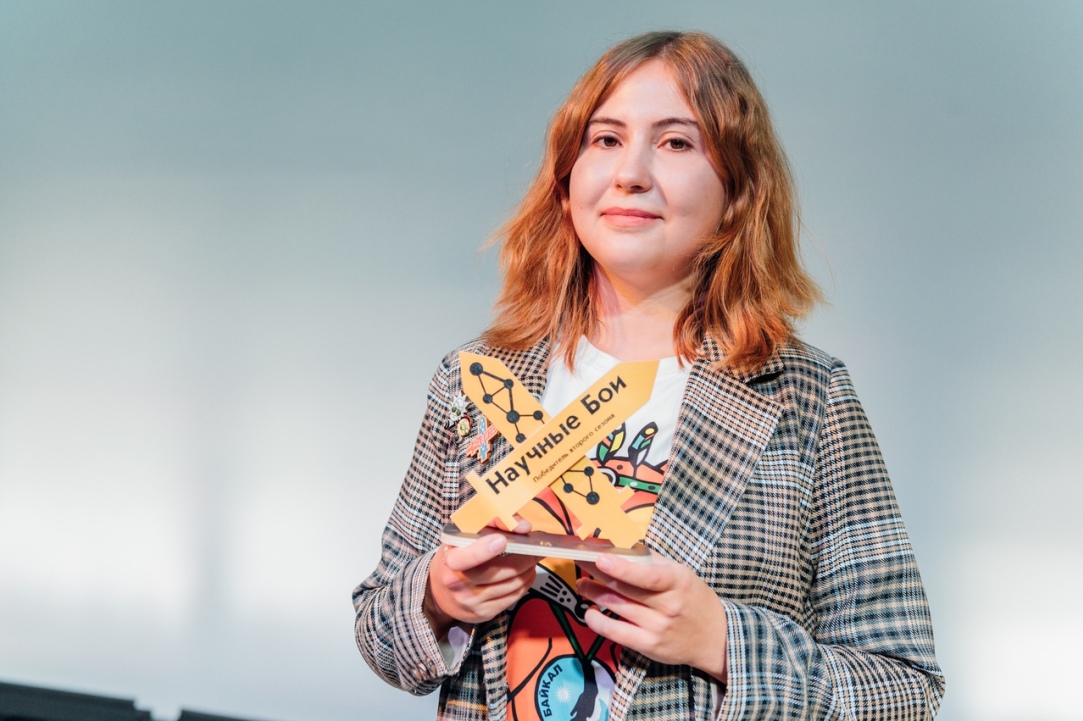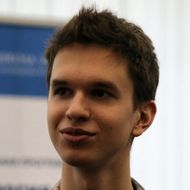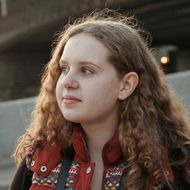HSE Science Battles Wrap Up Third Season

What professions in Russia are considered ‘dirty’? Do computers have empathy? What happens when the brain incorrectly predicts how we feel? The answers to these and other questions were tackled at the final round of the HSE Science Battles, which was held online for the first time this year. Read on to find out which performance was rated highest by the audience and jury and why the Science Battles are a must-see for everyone.
This year, the final round of the HSE Science Battles took place in an empty hall where participants received applause in the form of emojis in a chat panel, and hundreds of viewers watched from afar via their computer monitors. It was a new environment for the Science Battles, which is supported by the Centre for Student Academic Development and has just wrapped up its third season. The aim of these intellectual battles is to challenge students to talk about their scientific and scholarly research in simple, accessible language.
Grigory Bannikov, Manager, Centre for Student Academic Development, 2nd-year student, Master’s Programme ‘Sociology of Public and Business Sphere’

The main idea of the Science Battles is to bring together students who are interested in research and give them the opportunity to meet new people and learn something new. At HSE, students want to learn more than just the material they study in class. Therefore, there is a demand for more ways to develop. The Science Battles help do this. Students talk about their complex research in accessible terms. After all, it is not enough to conduct research; you still need to be able to let others know about it (and it is best if it is presented in simple terms and an engaging manner). Therefore, for presenters, participating in the Battles is both a challenge as well as an opportunity to learn how to speak in public. And for the audience, it’s a good chance to spend time in a friendly atmosphere with people who are also interested in learning.
The third season of Science Battles was special not only because of the final round’s online format. It was also special because, for the first time, the event was not just limited to the Moscow campus. Thanks to the online format, students such as Marina Kazyulina (HSE – Nizhny Novgorod) were able to participate. In the final round, Marina presented her study, ‘Artificial Empathy: What Makes a Computer More Human than People’. The researcher explained to the audience how computers can be taught to feel and analyze people's emotions.
Marina Kazyulina, 2nd-year student, Bachelor's Programme ‘Fundamental and Applied Linguistics’, HSE – Nizhny Novgorod

As a bachelor’s student who got into the field of linguistics, I understand that linguistics is a wide and varied field. I look at what different people are doing in the field and see what’s interesting to me, and what’s not. I like working with computers, language, and programming. The brain is also interesting to me. We have a Centre for Language and Brain at HSE—I would also like to work with them.
Research is an adventure for me. It’s like you’re walking through a dark dense forest, and you can’t necessarily make out the path. You have some kind of hunch, a hypothesis. But you don't know if it will work or not. But you have no choice but to go ahead and try. It's nice when you don’t have to walk this path on your own.
In the final round, the following participants presented their research:
Vladimir Mikheev, graduate of the Master’s Programme ‘Cognitive Sciences and Technologies: From Neuron to Cognition’. His project, ‘Others’ Senses: What Happens When the Brain Predicts Our Sensations Incorrectly’, is devoted to neuroscience and explains how the theory of the brain as a prediction machine can be applied to treat neurological diseases.
Maria Terskova, graduate of the Master’s Programme ‘Social Psychology’. In her study, ‘Dehumanization: How We “Dehumanize” People Doing Dirty Work’, Maria examines how we react to government officials, cleaners, and sex workers—and why we consider these professions to be dirty.
Vsevolod Nikolsky, graduate of the Master's Programme ‘Applied Mathematics and Informatics’, PhD student in the Department of Applied Mathematics. Thanks to his presentation of his project, ‘How Parallel Computing on a Supercomputer Opens Up New Opportunities in Science’, the audience learned what a supercomputer is and how it helps scientists in their research.
Each speaker has 10 minutes to present their topic. This is the rule. During this time, the participants must explain their project, discuss its relevance, and pique the interest of the audience and jury. This year the jury included Igor Utochkin, Ph.D. in Psychology and Head of the Laboratory for Cognitive Research; Alexander Lukin, winner of the second season of the Science Battles and alumnus of the Master's Programme ‘Physics’; Olga Dobrovidova, science journalist, senior copywriter of the Skoltech Press Service, and Associate Professor at ITMO University; Dmitry Dagaev, Ph.D. in Physics and Mathematics and Head of the Laboratory of Sports Studies; and Daniil Kuznetsov, Editor-in-Chief of the IQ.HSE.RU Research and Education Website.
Katya Petrova, Coordinator, HSE Science Battles, 3rd-year student, Bachelor’s Programme ‘Psychology’

The Science Battles provide a cool platform for fun conversations about science and research. After the speakers’ presentations, you can always discuss their research with them and with your fellow viewers. For speakers, this is an opportunity to work on their public speaking with a coach and receive an academic travel grant. The events have a really cool atmosphere—everyone is happy to meet new people, and everyone is aglow with new knowledge.
The winner of the Science Battles is determined by a vote. The audience and the jury awarded Maria Terskova for her project dedicated to ‘dirty’ professions. She will receive an academic travel grant in the amount of 100,000 rubles.
Maria Terskova, Alumna, Master’s Programme ‘Social Psychology’

I am so happy to have won! What’s surprising is that I actually got a bigger thrill out of participating in and winning the first round—probably because that round took place onsite with a face-to-face audience, so I could see people’s reactions in the moment. Everything felt more real, and it was more exciting. The first round was the hardest, because it’s difficult to present complex information without relying on a structure of academic jargon and make it understandable and accessible to everyone. For this I am grateful to our coach Olya, who opened a whole new world to me. By the final round it was already much easier for me to write my presentation. It was also hard to keep my shaking knees and hands in check, especially during my first time.
See also:
Pokémon, ARPANET, and the Mysterious East: Science Battles between Student Organisations at HSE
A special session of HSE Science Battles has taken place at the HSE Cultural Centre. This time, the speakers represented their student organisations and scientific fields. The evening brought together ideas about the future—from metaverses and deciphering ancient languages to neuromodular chips and the prospects of social sciences.
Science of Winning: Republic of Scientists Festival Held at HSE University
On November 8, HSE University hosted the Republic of Scientists Festival for the seventh time. The event aims to remind students that science is multifaceted and universal, to showcase areas of knowledge beyond their educational curriculum, and to connect early-career scientists with one another. Guests of the festival enjoyed interactive activities, popular science lectures by university faculty and alumni, and the grand finale of Season VII of Science Battles.
From Ingenious Fungi to Post-feminism: HSE University Hosts Season’s Last Science Battles Semi-Final
Season VI of Science Battles at HSE University is entering the homestretch. The June semi-final determined the list of finalists and helped many viewers choose their favourites. This time, young researchers decided to figure out how to conduct a police lineup without destroying a person’s life, as well as how to improve a child’s academic performance without instilling neurotic perfectionism. They also found out that fungi and mould help heal scars and save the environment, and that adherents of post-feminism have very mixed feelings about their own images on TikTok.
From Cultural Appropriation to Prison Jargon: Second Semi-Final of Science Battles Takes Place at HSE University
On March 19, the second semi-final of the fourth season of HSE University Science Battles brought together the topics of cultural appropriation, pharmacological neural networks, prison jargon, and ‘diseases’ of higher education on the same stage. Students from various degree programmes presented their projects in the Community space. Read on to find out more about the performances featured in the semi-finals.
From Hate-Watching to GMOs: Highlights of the HSE Science Battles’ Third Semi-Finals
The fifth season of HSE Science Battles is currently underway, with the Sber office serving as a venue for another stage of the battle. Four speakers fought for a place in the finals by presenting their research in a ‘TED Talks’ format. The HSE News Service reports on highlights from the event, including how to explain to your grandmother that GMOs aren’t dangerous, what font you should use to develop your memory, and who ‘hate-watchers’ are.
Robot Rights and Talking Babies: Discussions at HSE Science Battles
Four young scientists competed in the second semi-final of the fifth season of HSE University Science Battles, which was held at HSE Cultural Centre. What tasks lead students to cheat on exams, how babies learn to talk, whether artificial intelligence is subject to copyright, how to deal with false modesty — each researcher presented their work while the audience and the jury chose a winner to compete for the main prize of the season — an academic travel grant.
‘It Was Interesting to Showcase a Unique Student Project’
Held as part of the Second New Knowledge Marathon, the fourth HSE Science Battles attracted a wide audience. HSE Students Frol Sapronov, Marina Kasyulina, and Vsevolod Nikolsky took part in the competition’s new televised format to demonstrate how to talk about science vividly and in simple terms understandable to any audience.


